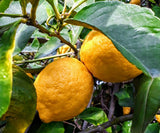It is thought that lemon trees first grew in India, the Assam region to be precise and in northern Burma. There is some debate about exactly where they originated but there is evidence that Lemon trees have been cultivated in Assam for 2,500 years. The story of people how people used lemons in the west is missing many details, yet lemons moved from region to region and were grown extensively throughout history.
Lemons, as we know them, developed from a cross between two different fruits - the bitter orange and the citron. The citron is like a lemon, but it is larger, has less juice, and it’s rind is thicker. Regardless of how this hybridization occurred - whether humans orchestrated the cross or if it happened naturally - the world is better off for having the lemon.

Lemons have been used in Ayurveda as medicine and food for thousands of years. On the Indian subcontinent lemons are referred to as ‘Golden Apples’ and are used for prevention, for cleansing the system and as remedies for many complaints.
Traders spread the fruit from Asia to Persia to the coast of the Mediterranean and into Africa. Trees were cultivated in Egypt, Palestine and in Sumer and arrived in Europe after 100ce. The trees were brought to Europe by soldiers returning home from the Crusades. At this time in Europe and for quite a long span of time after, it was grown as an ornamental tree.
In Medieval Egypt - the 1100s - there is record of a drink, much like lemonade, called Qatarzimat that was a popular beverage in Cairo markets. The drink most likely developed further east, but it’s origins are unknown. The first mention of Europeans using lemons in cooking was in the 1400s. The first major cultivation of the tree was in Genoa around this time.
The fruit was important enough that Christopher Columbus brought Lemon seeds with him on his journey to Haiti. The tree was grown throughout the Spanish colonies. A Spanish explorer in the late 1490s made the connection between lemons and a reduction of scurvy. This connection was lost and regained repeatedly. It wasn’t until much later, 1747, that lemons and vitamin C were studied in the first controlled medical experiments and written about as a cure for scurvy. This discovery wasn't universally implemented until 1932 when Vitamin C was isolated.

Western science and medicine is beginning to catch up with the knowledge of Ayurveda. There have been well over 500 scientific studies into the benefits of lemons and lemon essential oil, and they confirm much if not all of what Ayurveda teaches about lemons.
Lemons must be hand picked, there are no machines used in harvesting and they must be dry at the time of harvest. They are sorted by color and size and then washed. Conventional fruit is coated with a fungicide, they are then cured - which means that they are stored - this curing period can correspond with the time they spend in shipment. It is during this curing period that they turn yellow. Conventional lemons are coated with wax before being shipped to market. Organic fruit aren’t coated with fungicide or with wax. Lemon peel is densely nutritious and the essential oil is cold pressed from the peel. The peel is the thin yellow outer layer of the fruit. Because of the chemical coatings, it is important when buying lemons for the peel as well as the fruit that you choose the organic version.

Lemons contain antioxidants in several forms - vitamin C, small amounts of vitamin A, and a compound called d-limonene which is being studied for its cancer fighting abilities.
Antioxidants neutralize free radicals, which are mutant atoms that cause a chain reaction in the cells. Free radicals steal electrons from cells in a process called oxidation. Cell development is stifled without oxygen and the presence of free radicals wreaks havoc on cell growth and health. Antioxidants effectively stop free radicals because they give the free radical one of their own electrons. This ends the chain reaction and the free radical hunt for an electron. Lemon reduces oxidative stress in the cells.
On the surface of the skin, Lemon acts as an astringent to tighten and tone the skin. The essential oil is an antibacterial and a purifying disinfectant. Lemon acts to heal blemishes and remove extra oil and impurities from the skin. It is thought to shrink pores.
Lemon lightens and brightens skin and can help reduce the appearance of dark circles under the eyes. Pure lemon juice or essential oil can bleach the skin and hair and should be used with caution especially when going into the sun.

Our Citrus & Fruit Acid Cleanser utilizes the astringent and pore tightening qualities of Lemon to gently cleanse the skin of impurities.
The astringent and toning qualities of Lemon combine with skin soothing Shea butter in our Shea, Vitamin E & Menthol Aftershave.
The Essential Oil - Lemon brings a clean scent to a room and for this reason, can be a key ingredient to homemade natural cleaners. The scent of Lemon has been found to improve concentration and enhance mood. The scent is thought to also improve digestion.



Leave a comment